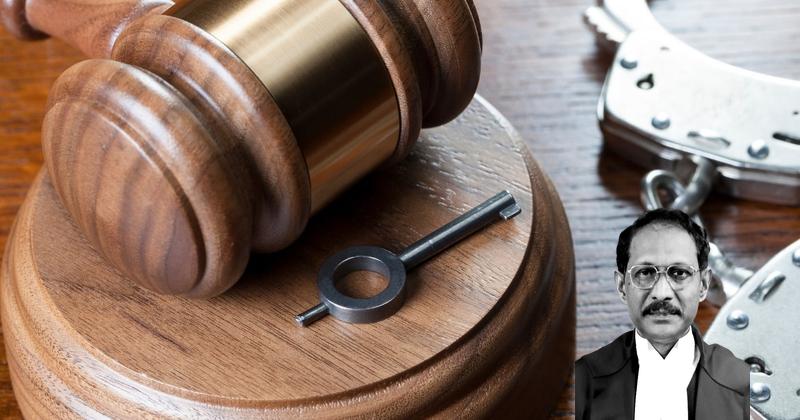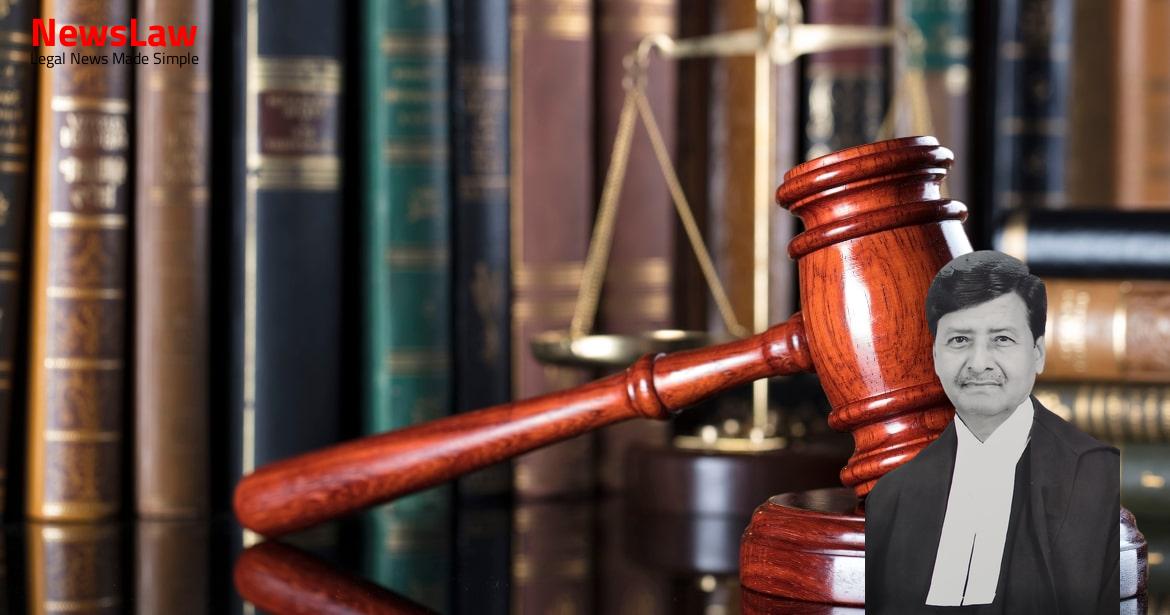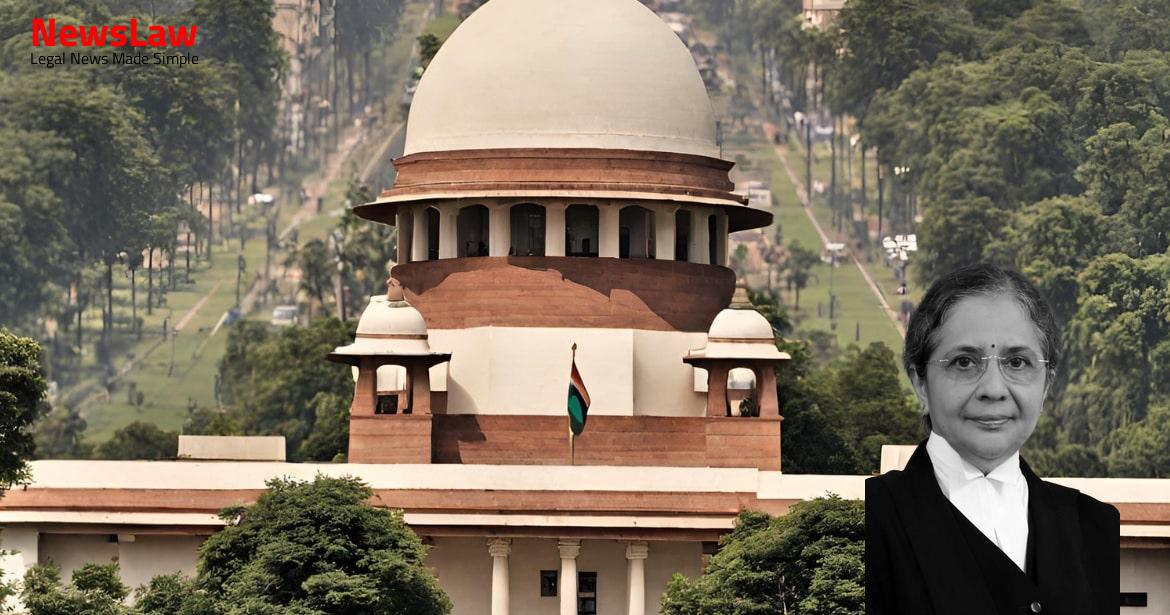Income Tax Appeal
Also Read: https://newslaw.in/case-type/civil/c-a-no-001144-001146-2011/
No 7 of 2014 by which the High Court has allowed the said appeal preferred by the Revenue and has held that the assessee is not entitled to the deduction under Section 80-IB of the Income Tax Act, 1961 (hereinafter referred to as “Act, 1961”) with respect to the receipts under the Duty Drawback Scheme (hereinafter referred to as “Duty Drawback”) and on transfer of Duty Entitlement Pass Book Scheme (hereinafter referred to as “DEPB”), the assessee has preferred the present appeal. Commissioner of Income Tax, (2009) 9 SCC 328 : (2009) 317 ITR 218 (SC) can be said to be per incuriam and allowed the deductions as claimed on the receipts of amount under DEPB Scheme and Duty Drawback Scheme. 4
By the impugned judgment and order and relying upon the decision of this Court in the case of Liberty India (supra) and the decision of this Court in the case of Commissioner of Income Tax, Karnataka Vs.
It is further submitted that the conclusion of Liberty India (supra) is based on the finding that “derived from” under Section 80-IB requires a “first degree” connection with the business of the industrial undertaking whereas the source of DEPB / Duty Drawback are incentives given under the Duty Exemption Remission Scheme / Section 75 of the Customs Act, 1962. Dharam Pal Prem Chand Ltd., (2009) 317 ITR 353 (Del) holding that the refund of excise duty should not be excluded in arriving at the profit derived from business for the purpose of claiming deduction under Section 80-IB. 7 It is next contended that in the case of Topman Exports (supra), it is held that the DEPB is assistance given by the Government to an exporter to pay customs duty on its imports and it is receivable once exports are made and an application under the DEPB Scheme is made. 8
It is submitted that, therefore, and in view of the development of law in Meghalaya Steels Limited (supra) and the Topman Exports (supra) DEPB / Duty Drawback are “profits and gains derived from any business” within the purview of Section 80-IB.
1 Insofar as the reliance placed by the assessee upon the decision of this Court in the case of Meghalaya Steels Limited (supra) is concerned, it is submitted that in the case of Meghalaya Steels Limited (supra), this Court has not disagreed with or disapproved the decision in the case of Liberty India (supra) or Sterling Foods, Mangalore (supra). It is submitted that even otherwise, the said decisions shall not be applicable in case of receipt of the amount under DEPB and Duty Drawback Schemes as the same cannot be said to be an income that falls under the head “profits and gains of business or profession”. That this Section applies to the following “industrial undertakings” which are eligible for deduction under the said Section:- a) Small scale industries into manufacturing and production b) Undertaking in industrially backward state and North-Eastern Region c) Ship d) Hotels e) Cold storage plants and cold chains f) Mineral oil and natural gas g) Housing projects h) Scientific research and development i) Processing, preservation and packaging of food items j) Multiplex theatre k) Convention centre l) Hospitals in rural and specified areas 4.4 It is next submitted that as per the language used in Section 80-IB with regard to calculating the deduction, the deduction would be applicable on “any profits and gains ‘derived from’ any business referred to in…” included in the gross total income of the assessee.
Also Read: https://newslaw.in/case-type/civil/acquisition-of-land-and-deemed-lapse-under-the-act-2013/
It is submitted that on a fair reading of Section 80-IB read with Section 28 and on true interpretation of Section 80-IB, the DEPB and Duty Drawback Schemes cannot be said to be deriving the income from the business undertaking and, therefore, deduction under Section 80-IB on such receipt of the Duty Drawback shall not be allowable as a deduction. 6 It is submitted that in the case of Sterling Foods, Mangalore (supra), while adjudicating the issue of whether on earning of import entitlements under an export promotion scheme of the Central Government, deduction under Section 80HH would be allowable or not, this Court gave the words “derived from” used in Section 80HH a restricted interpretation and it was observed that since the words “derived from” have been used, it shall suggest to go to the source of such profits and gains. It is submitted that though in the said decision, this Court has not held the decision in the case of Liberty India (supra) to be bad in law, in para 20, this Court has also observed that since if there is no export, there is no DEPB entitlement. It is next submitted that though binding, the ITAT did not follow the decisions of this Court in the case of Liberty India (supra) and Sterling Foods, Mangalore (supra), and, therefore, the High Court has rightly set aside the order passed by the ITAT following the decisions of this Court in the case of Liberty India (supra) and Sterling Foods, Mangalore (supra).
Profits and gains of business or profession.—The following income shall be chargeable to income tax under the head “Profits and gains of business or profession”, — XXXXXXXX ( iii – a ) profits on sale of a licence granted under the Imports (Control) Order, 1955, made under the Imports and Exports (Control) Act, 1947 (18 of 1947); ( iii – b ) cash assistance (by whatever name called) received or receivable by any person against exports under any scheme of the Government of India; ( iii – c ) any duty of customs or excise repaid or repayable as drawback to any person against exports under the Customs and Central Excise Duties Drawback Rules, 1971; ( iii-d ) any profit on the transfer of the Duty Entitlement Pass Book Scheme, being the Duty Remission Scheme under the export and import policy formulated and announced under Section 5 of the Foreign Trade (Development and Regulation) Act, 1992 (22 of 1992); ( iii-e ) any profit on the transfer of the Duty Free Replenishment Certificate, being the Duty Remission Scheme under the export and import policy formulated and announced under Section 5 of the Foreign Trade (Development and Regulation) Act, 1992 (2) This section applies to any industrial undertaking which fulfils all the following conditions, namely:— ( i ) it is not formed by splitting up, or the reconstruction, of a business already in existence:
Provided that this condition shall not apply in respect of an industrial undertaking which is formed as a result of the re-establishment, reconstruction or revival by the assessee of the business of any such industrial undertaking as is referred to in Section 33-B, in the circumstances and within the period specified in that section; ( ii ) it is not formed by the transfer to a new business of machinery or plant previously used for any purpose; ( iii ) it manufactures or produces any article or thing, not being any article or thing specified in the list in the Eleventh Schedule, or operates one or more cold storage plant or plants, in any part of India: —For the purposes of clause ( ii ), any machinery or plant which was used outside India by any person other than the assessee shall not be regarded as machinery or plant previously used for any purpose, if the following conditions are fulfilled, namely:— (a) such machinery or plant was not, at any time previous to the date of the installation by the assessee, used in India; (b) such machinery or plant is imported into India from any country outside India; and (c) no deduction on account of depreciation in respect of such machinery or plant has been allowed or is allowable under the provisions of this Act in computing the total income of any person for any period prior to the date of the installation of the machinery or plant by the assessee. —Where in the case of an industrial undertaking, any machinery or plant or any part thereof previously used for any purpose is transferred to a new business and the total value of the machinery or plant or part so transferred does not exceed twenty per cent of the total value of the machinery or plant used in the business, then, for the purposes of clause ( ii ) of this sub-section, the condition specified therein shall be deemed to have been complied with; ( iv ) in a case where the industrial undertaking manufactures or produces articles or things, the undertaking employs ten or more workers in a manufacturing process carried on with the aid of power, or employs twenty or more workers in a manufacturing process carried on without the aid of power. (3) The amount of deduction in the case of an industrial undertaking shall be twenty-five per cent (or thirty per cent where the assessee is a company), of the profits and gains derived from such industrial undertaking for a period of ten consecutive assessment years (or twelve consecutive assessment years where the assessee is a cooperative society) beginning with the initial assessment year subject to the fulfilment of the following conditions, namely:— ( i ) it begins to manufacture or produce, articles or things or to operate such plant or plants at any time during the period beginning from the 1st day of April, 1991 and ending on the 31st day of March, 1995 or such further period as the Central Government may, by notification in the Official Gazette, specify with reference to any particular undertaking; ( ii ) where it is an industrial undertaking being a small-scale industrial undertaking, it begins to manufacture or produce articles or things or to operate its cold storage plant not specified in sub-section (4) or sub-section (5) at any time during the period beginning on the 1st day of April, 1995 and ending on the 31st day of March, 2002.
Also Read: https://newslaw.in/case-type/civil/c-a-no-003481-003481-2022/
(4) The amount of deduction in the case of an industrial undertaking in an industrially backward State specified in the Eighth Schedule shall be hundred per cent of the profits and gains derived from such industrial undertaking for five assessment years beginning with the initial assessment year and thereafter twenty-five per cent (or thirty per cent where the assessee is a company) of the profits and gains derived from such industrial undertaking: Provided that the total period of deduction does not exceed ten consecutive asssessment years (or twelve consecutive assessment years where the assessee is a cooperative society) subject to fulfilment of the condition that it begins to manufacture or produce articles or things or to operate its cold storage plant or plants during the period beginning on the 1st day of April, 1993 and ending on the 31st day of March, 2004 : Provided also that in the case of an industrial undertaking in the State of Jammu and Kashmir, the provisions of the first proviso shall have effect as if for the figures, letters and words “31st day of March, 2004”, the figures, letters and words “31st day of March, 2012” had been substituted: Provided also that no deduction under this sub-section shall be allowed to an industrial undertaking in the State of Jammu and Kashmir which is engaged in the manufacture or production of any article or thing specified in Part C of the Thirteenth Schedule.
(5) The amount of deduction in the case of an industrial undertaking located in such industrially backward districts as the Central Government may, having regard to the prescribed guidelines, by notification in the Official Gazette, specify in this behalf as industrially backward district of category ‘A’ or an industrially backward district of category ‘B’ shall be,— ( i ) hundred per cent of the profits and gains derived from an industrial undertaking located in a backward district of category ‘A’ for five assessment years beginning with the initial assessment year and thereafter, twenty-five per cent (or thirty per cent where the assessee is a company) of the profits and gains of an industrial undertaking: Provided that the total period of deduction shall not exceed ten consecutive assessment years or where the assessee is a cooperative society, twelve consecutive assessment years: Provided further that the industrial undertaking begins to manufacture or produce articles or things or to operate its cold storage plant or plants at any time during the period beginning on the 1st day of October, 1994 and ending on the 31st day of March, 2004 ; ( ii ) hundred per cent of the profits and gains derived from an industrial undertaking located in a backward district of category ‘B’ for three assessment years beginning with the initial assessment year and thereafter, twenty-five per cent (or thirty per cent where the assessee is a company) of the profits and gains of an industrial undertaking: Provided that the total period of deduction does not exceed eight consecutive assessment years (or where the assessee is a cooperative society, twelve consecutive assessment years): Provided further that the industrial undertaking begins to manufacture or produce articles or things or to operate its cold storage plant or plants at any time during the period beginning on the 1st day of October, 1994 and ending on the 31st day of March, 2004. However, thereafter, and in order to put an end to the dispute, the legislature by way of inserting clauses 28 (iiia), (iiib), (iiic), (iiid) and (iiie) has made the said incentives taxable under the head of “profits and gains of business and profession”. 3 After taking into consideration the DEPB and Duty Drawback Schemes, ultimately, it is observed and held in the case of Liberty India (supra) that DEPB / Duty Drawback Schemes are incentives which flow from the schemes framed by the Central Government or from Section 75 of the Customs Act, 1962 and, hence, incentive profits are not profits derived from the eligible business under Section 80-IB. Before analysing Section 80-IB, as a prefatory note, it needs to be mentioned that the 1961 Act broadly provides for two types of tax incentives, namely, investment-linked incentives and profit-linked incentives. On the other hand, according to the Department, DEPB credit/duty drawback receipt do not come within the first degree source as the said incentives flow from the incentive schemes enacted by the Government of India or from Section 75 of the Customs Act, 1962.
Continuing our analysis of Sections 80-IA/80-IB it may be mentioned that sub- section (13) of Section 80-IB provides for applicability of the provisions of sub-section (5) and sub-sections (7) to (12) of Section 80- IA, so far as may be, applicable to the eligible business under Section 80-IB. On an analysis of Sections 80-IA and 80-IB it becomes clear that any industrial undertaking, which becomes eligible on satisfying sub-section (2), would be entitled to deduction under sub-section (1) only to the extent of profits derived from such industrial undertaking after specified date(s). Therefore, in our view, DEPB/duty drawback are incentives which flow from the schemes framed by the Central Government or from Section 75 of the Customs Act, 1962, hence, incentives profits are not profits derived from the eligible business under Section 80-IB. Sub-section (2) of Section 75 of the Customs Act requires the amount of drawback to be determined on a consideration of all the circumstances prevalent in a particular trade and also based on the facts situation relevant in respect of each of various classes of goods imported.
should not be treated as adjustment (credited) to cost of purchase or manufacture of goods. The appeals are, accordingly, dismissed with no order as to costs.” 5 Prior thereto, the treatment of “profits and gains derived from industrial undertakings” for the purpose of determining tax liability came up for consideration before this Court in the case of Sterling Foods, Mangalore (supra), which was followed by this Court in the case of Liberty India (supra). The Division Bench of the High Court observed that to obtain the benefit of Section 80-HH the assessee had to establish that the profits and gains were derived from its industrial undertaking and it was just not sufficient that a commercial connection was established between the profits earned and the industrial undertaking.
The source referable to the profits and gains arising out of the sale proceeds of the import entitlement was, therefore, the scheme of the Central Government and not the industrial undertaking of the assessee. The sale consideration therefrom cannot, in our view, be held to constitute a profit and gain derived from the assessee’s industrial undertaking.” 6 Therefore, following the law laid down by this Court in the case of Sterling Foods, Mangalore (supra) and Liberty India (supra) as such, no error has been committed by the High Court in holding that on the profit from DEPB and Duty Drawback claims, the assessee shall not be entitled to the deductions under Section 80-IB as such income cannot be said to be an income “derived from” industrial undertaking and even otherwise as per Section 28(iiid) and (iiie), such an income is chargeable to tax. While dealing with the decision in the case of Liberty India (supra), this Court distinguished Duty Entitlement Pass Book and Duty Drawback Schemes and specifically observed that the DPEB / Duty Drawback Scheme is not related to the business of an industrial undertaking for manufacturing or selling its products and the DEPB entitlement arises only when the undertaking goes on to export the said product, that is, after it manufactures or produces the same.
Case Title: M/S. SARAF EXPORTS Vs. COMMISSIONER OF INCOME TAX, JAIPUR – III (2023 INSC 331)
Case Number: C.A. No.-004822-004822 / 2022



